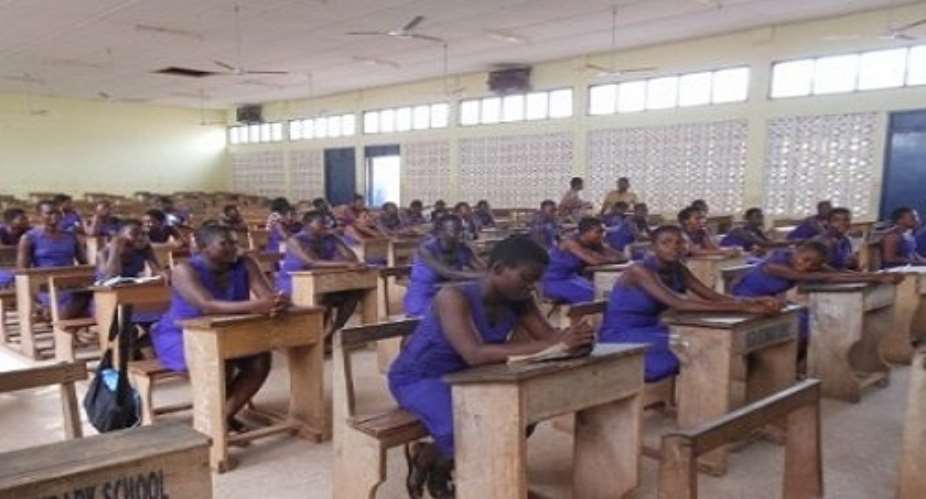According to the Oxford Dictionary, encroachment means to take another's possessions or rights gradually or stealthily or to intrude gradually, stealthily, or insidiously upon the rights, property, etc., of another. Some types of encroachment, per the classification of engineers, are Major encroachments and Minor Encroachments.
The encroachment of school lands is a worrying phenomenon. In December 2011, the Head of Security of Ghana Atomic Energy Commission said that about 30% of the total land of about 2000 acres belonging to the Commission has been encroached upon. The encroachment on Achimota School, Odorgonno and Christian Methodist Senior High Schools' lands in Accra, the Takoradi Community Development Vocational Institute, my alma matter Sogakofe Senior High School, T.I Ahmadiya Senior High School in Kumasi and others elsewhere across the country, are still fresh on our minds. Statistics show that as at 2012, there are about 496 senior high schools, 7,656 junior high schools and 13,510 primary schools whose lands are encroached upon by private developers.
In the case of the Sogakofe Senior High School, all attempts by the current administration of the school with support from the old students and the Parent Teacher Association to build a fence wall around the 319 acres of land allocated to the school has proved futile as encroachers and local settlers ended up destroying large portions of the fence wall. Although the lands commission has directed that the development be discontinued, private developers still continue to build.
Basic schools need land, for the construction of additional classrooms to meet the increasing enrolments as our population also rises, while secondary school put up new departments, boarding facilities, recreational facilities, sick bays, school farms and bungalows for teachers and other staff members among other necessary needs. Universities which are whole communities by themselves need a great amount of land for very varied purposes.
The encroachments affect the expansion of school facilities and limited the enrolment of more students. It affects the administration of the school including effective teaching and learning as teaching and non-teaching staff reside outside the schools. Discipline is at its low ebb when staff cannot monitor the daily activities of students especially in the second cycle institutions. Encroachment on school lands also create tension between the schools' authorities and encroachers which are mostly permitted by the traditional authorities. There are also legal battles these acts of encroachment bring about; sometimes disrupting the productive activities of the schools involved causing great disadvantages to innocent students.
In 2011 it was announced that a nationwide exercise by the Ministry of Education to reclaim and protect school lands that have been encroached upon is to commence soon. The Head of the Public Relations Unit of the Ministry of Education said the programme to retrieve the school lands, which would be done in collaboration with the Ministry of Lands and Natural Resources, would involve traditional rulers and district assemblies. We are yet to see this reclamation programme take off.
There is the need for a permanent solution to this very disturbing phenomenon. Kwara State of the Federal Republic of Nigeria for example formed a Committee on Land Encroachment to deal with the issue. We can also adopt same approach. There should be a body that should be the sole custodian and responsible for the acquisition of lands for schools. Proper demarcation and documentation of school lands should be carried out in earnest by the appropriate authorities. While we hope the government and other stakeholders in the education sector should appeal to traditional leaders to desist from selling undeveloped school lands and any leader found culpable should be brought to book.
Nelson Mandela once said “Education is the most powerful weapon which you can use to change the world”. If Ghana needs to develop, education should be approached with all the seriousness it deserves. Let us not consider the protection of school lands as peripheral to the provision of quality teaching and learning facilities for our students. A conducive school environment engenders quality education and the total development of students.
Gabriel Edzordzi Agbozo is an old student of Sogakofe Senior High School and Director of International Affairs at Beyonders Foundation.





 Ghana will make maiden voyage into space should Bawumia become President — Chair...
Ghana will make maiden voyage into space should Bawumia become President — Chair...
 Train crash: Despite the sabotage, we shall not be deterred and will persevere —...
Train crash: Despite the sabotage, we shall not be deterred and will persevere —...
 Tema-Mpakadan railway project a perversion of the original viable concept design...
Tema-Mpakadan railway project a perversion of the original viable concept design...
 Train crash: Elsewhere, everyone involved in the test will either be fired or re...
Train crash: Elsewhere, everyone involved in the test will either be fired or re...
 Ghana, other election bound-countries must build fiscal buffers – IMF admonishes
Ghana, other election bound-countries must build fiscal buffers – IMF admonishes
 Parliament reconvenes late May, denies Speaker Bagbin delaying recall over NDC t...
Parliament reconvenes late May, denies Speaker Bagbin delaying recall over NDC t...
 $100m needed to revitalise Ghana's poultry sector — GNAPF
$100m needed to revitalise Ghana's poultry sector — GNAPF
 Driver arrested for causing train collision on Tema-Mpakadan Railway Line
Driver arrested for causing train collision on Tema-Mpakadan Railway Line
 Police grab trucker for Tema-Mpakadan rail accident
Police grab trucker for Tema-Mpakadan rail accident
 Gov't plans to revise traditional customs following Gborbu child marriage
Gov't plans to revise traditional customs following Gborbu child marriage
